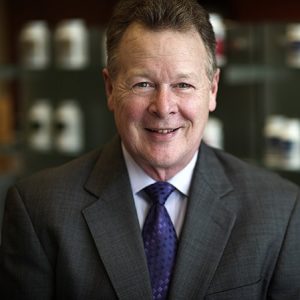by Jim Paoletti, BS Pharmacy, FAARM, FIACP
When symptoms of hypothyroidism exist, there are many cases where the cause of the problem is not lack of thyroid hormone being produced from the thyroid gland. Before initiation of Thyroid Replacement Therapy (ThRT), it is very important to determine if the gland has the capacity to produce optimal thyroid hormones, primarily T4.
Total T4 (TT4) levels should be evaluated to see if they are optimal. If lack of production is determined, then possibly the patient does not have sufficient quantities of the necessary elements required for making thyroid hormone: tyrosine and iodine. Tyrosine is usually not a problem as most people get it in their diet. Vegans and vegetarians may lack tyrosine, as well as body builders who take amino acids supplements, and tyrosine is blocked by competitive absorption with the other amino acids. Furthermore, iodine deficiency exists in a large percentage of patients hypothyroid symptoms.
Related: Webinar Recording: Iodine & Autoimmune Thyroid Disorders with Dr. David Browntein
If thyroid production is optimal, next consider whether there is optimal unbound free hormone available to work at the receptor. Excessive binding is commonly caused by oral estrogen therapy, including oral contraceptives. Oral thyroid replacement therapy can also cause excessive binding.
In addition, conversion from the inactive T4 molecule to the active T3 molecule should be considered as a possible source of hypothyroid symptoms. Factors that inhibit the 5’deiodinase enzyme that converts the T4 to T3 include stress and deficiencies of selenium, zinc and a number of other vitamins and minerals.
Even when production, binding, and conversion are not the issue, free T3 hormone must be properly transported into and within the cell, and the receptors must respond optimally to achieve ideal management of symptoms. Factors which affect transport, receptor density and receptor response include cortisol, ferritin, and Vitamin D.
- Chronic high or low cortisol decrease thyroid receptor response.
- Ferritin should be in a range of 90-110 ng/ml and
- Vitamin D in a range of 60-80 ng/ml to get optimal thyroid response.
There are often multiple sources of problems causing symptoms of hypothyroidism, and many can be addressed without the need for ThRT. If ThRT is administered in excess of what is needed, the result may be a temporary improvement in symptoms the first few weeks, followed by a return of symptoms. The cause of this phenomenon is the body increasing Thyroid Binding Globulin (TBG) in response to the thyroid it determines as excessive and therefore increases binding of the hormone. The increase in TBG can take place gradually over 2 to 3 months, so the net effect of any initiation or change in ThRT is not seen in the initial response to therapy or change in dose.
Other problems that may cause symptoms of hypothyroidism is autoimmune reactions or heavy metal toxicities that damage the cells of the thyroid gland. Autoimmune reactions are the number one cause of all thyroid conditions. Thyroid tests should therefore always include at least one test to check for autoimmune antibodies.
These tests include:
- Thyroid Peroxidase antibody (TPO or TPOAb)
- Thyroglobulin antibody (TgAb)
- Thyroid stimulating hormone receptor antibody (TRAb).
I prefer to use TPO as it appears to identify a reaction most commonly. If autoimmune reaction is suspected, TgAb can also be tested, or all three tests can be ordered. Heavy metal toxicity tests can also be ordered if systemic symptoms indicate.
Related: Autoimmunity, Inflammation and Adrenal Function
 Jim Paoletti, BS Pharmacy, FAARFM, FIACP, is a Clinical Consultant with over 30 years of experience creating and using bio-identical hormone therapies in both retail pharmacy and clinical practice.
Jim Paoletti, BS Pharmacy, FAARFM, FIACP, is a Clinical Consultant with over 30 years of experience creating and using bio-identical hormone therapies in both retail pharmacy and clinical practice.
Jim is a Diplomat in Functional Medicine in addition to being a former faculty member for the Fellowship of Functional Medicine. Jim is also author of the book “A Practitioner’s Guide to Physiologic Bioidentical Hormone Balance.”
At Power2Practice, he applies his wealth of knowledge and experience by hosting live webinars and creating useful content, such as blogs, podcasts and clinical support tools.
Join us on Wednesday, May 18, 2018, for a webinar on Autoimmune Thyroid Disorders presented by Jim Paoletti, BS Pharmacy, FAARM, FIACP.
Click here to save your spot
Brought to you by Power2Practice, the practice performance system built for integrative medicine allowing you to more effectively run and optimize your business. Our goal is to save you time, increase staff productivity, boost patient engagement and provide easy tools to increase your profits.
Watch this quick video to see why Power2Practice is different.

